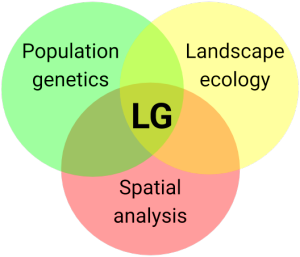Doutorando: Rhaphael Alves Silva. Data: 29/10/2019, às 16:00 horas no Anfiteatro do ESB. Orientador: Prof. Eduardo S. G. Mizubuti.
Landscape genetics (LG) was set as a field of study in 2003 by Manel et al. (doi:10.1016/S0169-5347(03)00008-9), and is defined as “research that combines population genetics, landscape ecology, and spatial analytical techniques to explicitly quantify the effects of landscape composition, configuration, and matrix quality on microevolutionary processes, such as gene flow, drift, and selection, using neutral and adaptive genetic data”. In general, three analytical steps are necessary to obtain the goals of LG: measure genetic variation, landscape heterogeneity quantification and the statistical linking of both landscape heterogeneity and genetic variation. Until now, LG approach has been applied to study animals, plants, and some microorganisms that cause diseases in humans, such as the rabies virus. There are few studies of plant pathogen populations using the LG approach. Nevertheless, LG can be useful to understand how the landscape affects the genetic variation of the population of plant pathogens. The goal of the seminar is to present definitions, to comment on common analytical tools used in LG studies and to illustrate the applications of this field in plant pathology.

